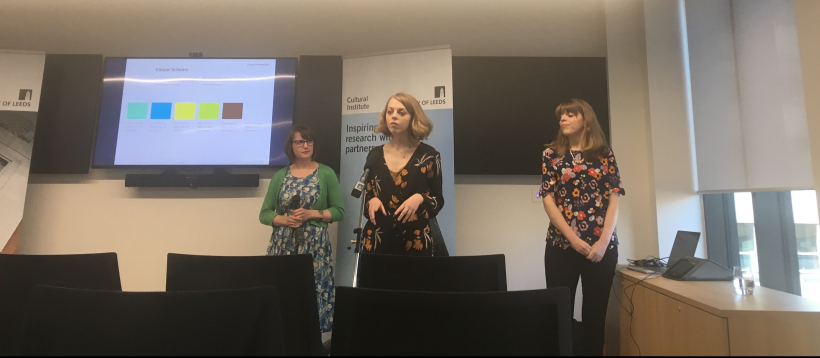Creative Labs explores cultural dimensions of climate change

Land Lines, a research project exploring British nature writing from the late 18th century to the present, was one of four teams that recently became involved with the Leeds Cultural Institute project Creative Labs: the Climate Edition, with support from the Priestley International Centre for Climate.
Uniting academics with creative partners, the Creative Labs intend to encourage collaborative new projects, not only across academic disciplines, but more widely across academia and other creative industries (although there is no necessity to produce outputs from the process). The experience is an opportunity to explore novel ways of approaching specific research questions, to solve urgent problems and potentially to generate new research.
This most recent edition of Creative Labs focused on climate, encouraging participants to work together to develop new partnerships and cross-pollinate ideas to address the multiple issues and questions arising from climate change. There was also an explicit focus on the cultural dimensions of climate change, focusing on communications and creativity. After a few weeks of working to develop a specific project or idea together, researchers and creative partners presented at a workshop on Thursday 28th June to disseminate their ideas across other working groups and beyond. At this event, four lab teams shared their initial proposals for follow-on projects, ideas for further development, and other collaborative endeavours.
The first team to present their project was the graphic design duo Buttercrumble (Chloe and Abigail Baldwin) and their academic partner Dr Katy Roelich (pictured above). Introducing their work on ‘Newtopia’, the team described their focus on changing behaviours and community in the context of cities. Through a series of virtual city workshops, the most important features of a city to its inhabitants include greenery, space, aesthetics and a sense of community. In order to create a medium for participants to engage with and design their own ideal city, the team produced illustrated images to work as part of a city design computer program for workshop participants to interact with.
Next, Dr Pippa Marland and Dr David Higgins from the Land Lines research team, along with creative producer Suzie Cross, presented their idea for a follow-on project after Land Lines comes to an end in April 2019. The idea for this project, which is provisionally entitled ‘Tracks, Traces, Trails’ focuses on taking nature writing beyond the page and into the public sphere.
The idea came into being through collaboration with Natural England, through an initial meeting with Water@Leeds. With a goal of reweaving stories of wildlife and nature back into culture, building compelling narratives, as well as preserving heritage and new habitats, the project intends to open out thinking about nature writing in terms of using visuals, kinetic activities and incorporating a sense of playfulness into communicating with new communities.
Possible avenues for development included a web app, a children’s book on a migrating bird species, and walking activities with creative interventions, as well as possible classroom toolkits and oral storytelling between senior citizens and young people.
The third presentation was given by Dr Lea Berrang-Ford from Indigenous Health Adaptation to Climate Change (IHACC) and photographer Elisabeth de Bezenac, who accompanied the research group from IHACC on a research trip to South Africa. The presentation focused on the creative products of this trip, with photos from Elisabeth displaying a new kind of self-reflexive consideration of the researchers themselves and as a team, as opposed to their subjects. Reporting on possible avenues for further collaboration, the team described changing relationships within the team and the importance of inter-personal connections in order to form working relationships.
The final team to present were representatives from design company Flat-e (Ruth Parker and Matt Bateman), research fellow Cat Scott, and Lecturer in Composition and Music Technology Scott McLaughlin. Focusing on the dynamics of forests and trees, the group presented several fascinating ways of ‘mediating wilderness’, including virtual- and augmented-reality scenarios viewed through Google Cardboard, one of which represented the journey of carbon particles being absorbed from the air by a tree and eventually entering the soil through the roots. With a wide range of expertise, from forests and their relationship with climate and atmosphere to creative design and music, inter-disciplinary research ideas and possible public engagement enterprises were discussed.
Ending with a Q&A with audience members, the Creative Labs proved to be an excellent environment for stimulating cross-disciplinary research and new collaborative projects, and offered a fascinating range of ways to approach the cultural dimensions of climate change and its related effects in our contemporary world.
Lucy Rowland, Postgraduate Researcher, School of English, University of Leeds
First published on Land Lines, 10 July 2018
